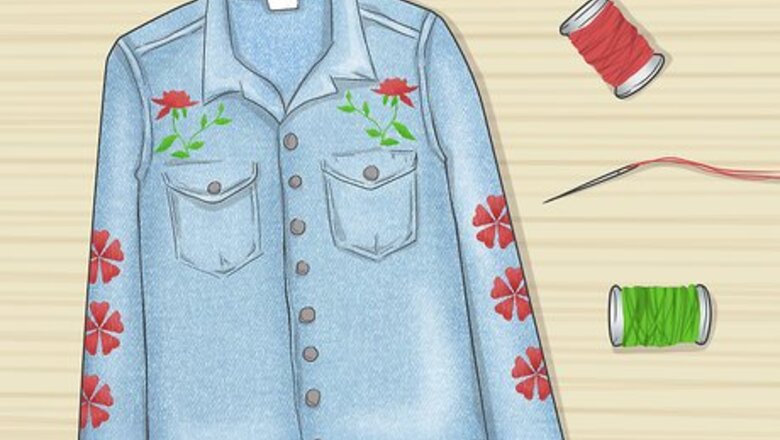
views
Adding Embellishments
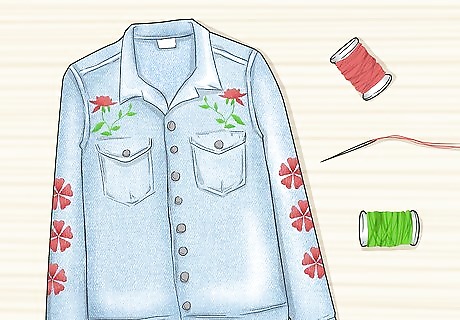
Create embroidery using a needle and thread. Sew your own creations or designs onto a jacket, shirt, or pair of pants. You can pick out a pattern from a book or online, or create one yourself. Make sure you use a needle and thread that suits your fabric. For example, if you’re embroidering a pair of jeans, you’ll want thick thread and a larger needle.
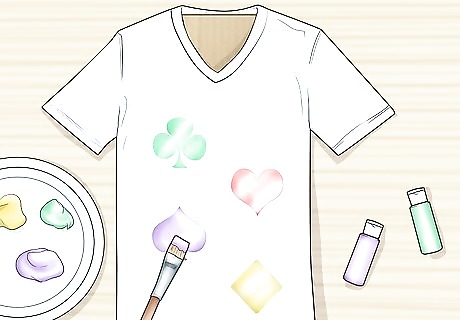
Use fabric paint to create personalized designs. Pick out a color of fabric paint that you’d like to use on a pair of jeans, jacket, or shirt. Use a paintbrush or foam brush to paint the fabric paint onto the clothing, either using a stencil as a pattern or going free-hand. You could cut a small heart stencil out of paper, using the stencil to paint hearts all over a jean jacket. As a free-style option, use different colors of fabric paint and a thin paintbrush to create a picture or design, such as a dog, flower, or piece of fruit, on a pocket of a shirt. You can also use bottled fabric paints that come in a squeezable form.
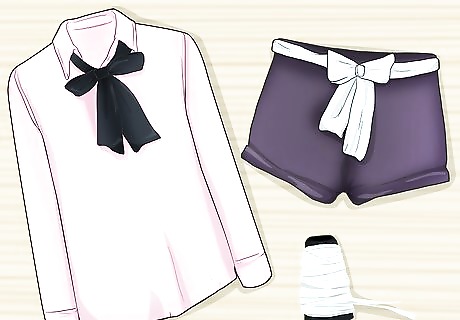
Sew bows onto your clothes for a cute look. You can sew 2 pieces of ribbon onto an open-back sweater, allowing you to tie the ribbon together to create a bow. You can also sew bows onto a pocket of a t-shirt or jacket, or onto the belt loops of shorts or pants.
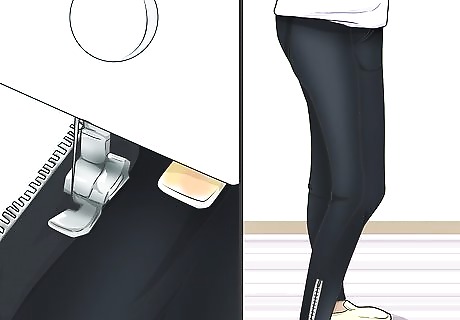
Attach a zipper to the side of a shirt or bottom of a pair of pants. To add style to your outfits while also making your clothing easier to put on, cut a slit where you’d like the new zipper to go. Now all you have to do is line the zipper up with the cut edges and sew it in place. Attach a zipper to the bottom of each leg on a pair of skinny jeans to make taking them on and off easier. Insert a black or bold zipper on a flowy shirt to add some flair.
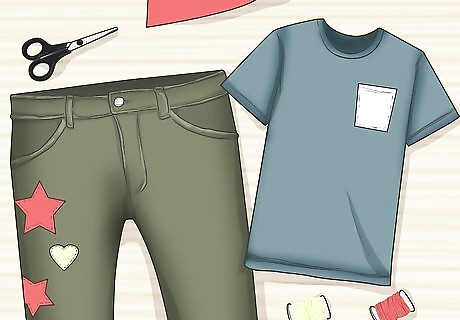
Add pockets or patches made of different fabrics to your clothes. Cut out a pocket square using a fabric that you like and sew it on to the front of a plain shirt to customize it. You can also cut out pieces of cool fabric in different shapes, such as squares, hearts, or stars, and sew them onto jackets or pants as patches. For example, cut 2 hearts out of a red velvet fabric. Sew 1 heart onto each sleeve of a jacket to create unique elbow patches. Folding over the cut or frayed edges of a patch or piece of fabric before sewing a patch onto your clothes will provide a more clean-cut look.
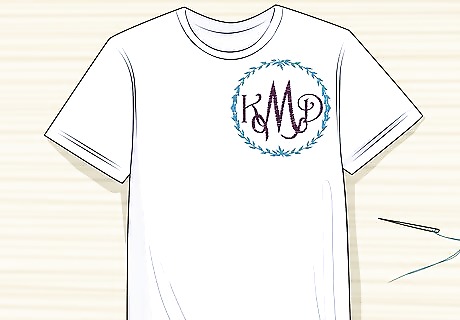
Personalize a shirt or pair of pants by creating a monogram. If you have a monogramming machine, you can use this to add your own personal monogram onto an article of clothing to make it your own. If you’re confident sewing your initials into your clothing free-hand, you can do this as well. There are also places you can take clothes to get monogrammed by a professional. Do a quick online search to find a local monogrammer near you.
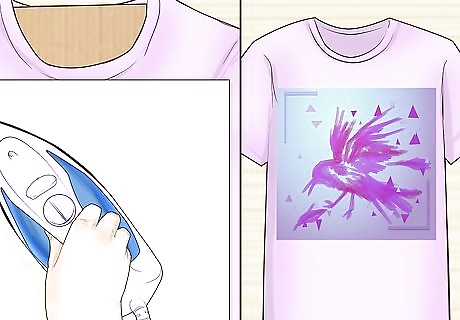
Design a professional look using iron-on transfers. You can buy iron-on transfers at a craft store or online that are already designed and ready to be ironed on to your clothing. Follow the instructions on the transfer to determine how long to iron the design, as well as how to wash and treat the clothing. You can also create your own transfer by printing out a unique design onto transfer paper using your home printer.
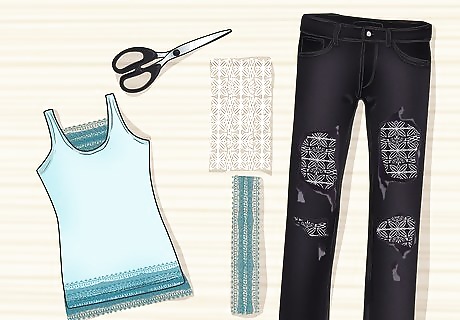
Add lace to tank tops, jeans, or shorts. You can match the color of a thick lace to a tank top, sewing the lace on to create sleeves. Adding a white lace trim to the bottom of a pair of shorts also creates a customized look. If you have holes or slits in your jeans, try sewing lace onto the inside where the slits are to add some style to your outfit. Use a thread color that matches the lace.
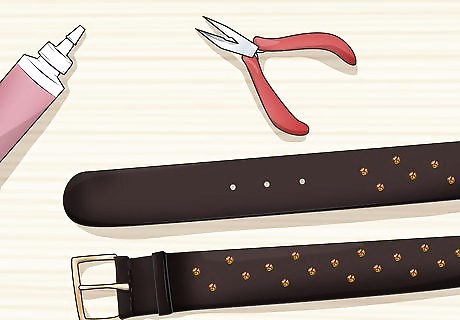
Purchase or create a customized belt. You can buy the materials to create a leather or fabric belt, choosing a design that you like and measuring your own waist to get the right fit. You can also get leather belts personally engraved, giving them a unique look.
Transforming Old Clothing
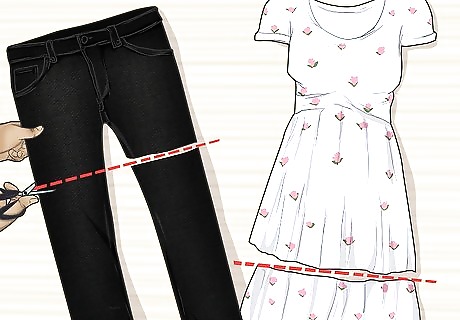
Shorten a dress, shirt, or pair of pants. Turn a maxi or mid-length dress into an above-the-knee dress by using scissors to trim the bottom. You can also turn a regular shirt into a cropped top, as well as turning a pair of jeans into a pair of capris or jean shorts. If desired, you can fix the hem by creating a fold at the very bottom of the article of clothing and sewing it together for a more polished look.
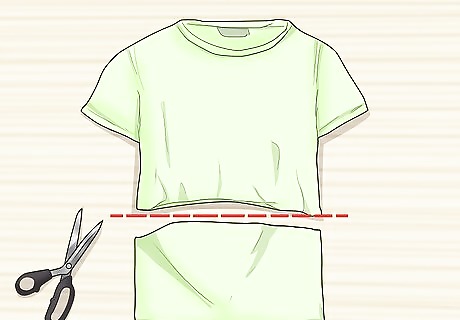
Turn a t-shirt into a cropped top. Take a t-shirt and cut off the sleeves so that it resembles a tank top. If the t-shirt has a high neckline, cut a deeper U-shape where your head would go. Lastly, trim the bottom of the shirt to create a cropped top, measuring how short you want the top before cutting. It’s best to cut a little bit off at a time — you can always cut more if needed.
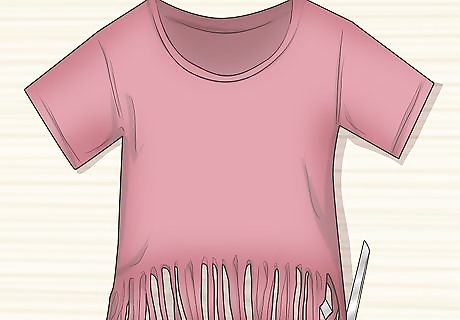
Use scissors to create a fringe t-shirt. Starting at the bottom of the shirt, use scissors to cut vertical strips into the shirt. Do this around the entire bottom of the shirt, cutting even lines and deciding how far up the shirt you’d like the fringe to go. Most fringe shirts have the fringe line stopping right above your natural waistline.
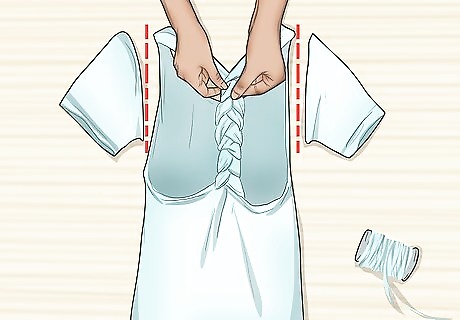
Braid the back of a shirt to create a racerback. Cut off the sleeves of a shirt, cutting a bit deeper than a normal tank top so that most of the sides of the shirt are removed. Separate the back of the shirt from the neckline, cutting right where the stitching is at the top. Cut 3 strips into the back of the shirt to braid them, and then sew the top of the braid back onto the neckline. When you cut the sleeves of the shirt, you'll be creating a drop armhole tank. Once you’re finished, the front of the shirt should resemble a normal tank top and the back of the shirt will have 1 braid going down the center of your back.
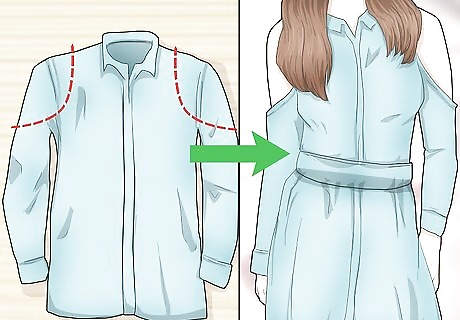
Create a dress out of a men’s shirt. Take a men’s collared shirt that’s a bit long and customize it by cutting off the sleeves and pairing it with a belt and leggings. You can also cut out slits at the top of each sleeve, creating a bare-shoulder look.
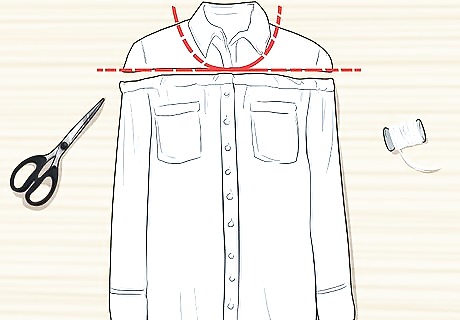
Cut off a collar to form an off-the-shoulder top. Using scissors, cut off the collar on a collared shirt, going all the way around the neck. Once the collar is completely off, you can trim the hole to be as large and wide as you’d like, creating an off-the-shoulder top. Try on the shirt after you've cut off the collar before making additional cuts to see how the shirt is fitting on your shoulders.
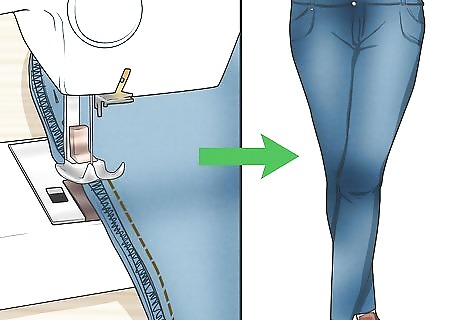
Get your clothing fitted. If you have a suit that's a bit baggy on you or a pair of pants that are just too long, take your clothes to get fitted so that they're your exact size. Taking in a hemline or adjusting a waistband can transform your clothes into entirely new pieces.
Creating Cut-Outs
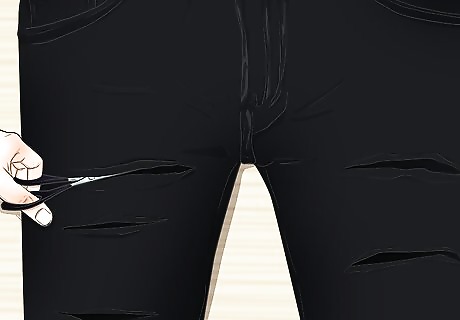
Use scissors to create slits in a pair of jeans or pants. For a grungier look, cut small horizontal slits into jeans, creating tears if desired. You can make the cuts close together and tiny or spread out and wide, whichever suits your style. Creating slits right where your knees go in a pair of jeans is a popular choice.
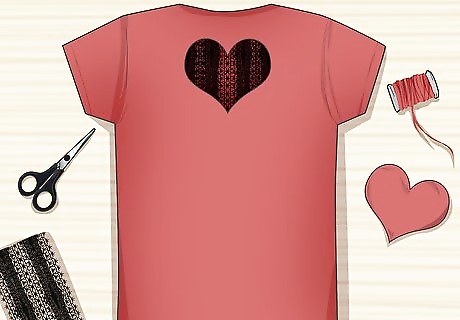
Cut designs into shirts to create lace inserts. Draw and cut out a design in the back of your shirt, using a stencil or shape to trace, if desired. Then you can either sew lace into the shirt where the cut-out is, or you can iron hem tape into the fabric to keep the lace in place. For example, trace a symbol like a star or heart onto the back of your shirt. Cut out the star using scissors and then replace the shirt material you just removed with lace. Choosing a lace that’s a different color than the shirt will help the lace pop. Choose a shirt made of fabric that will hold together when cut into, such as cotton, flannel, or linen.
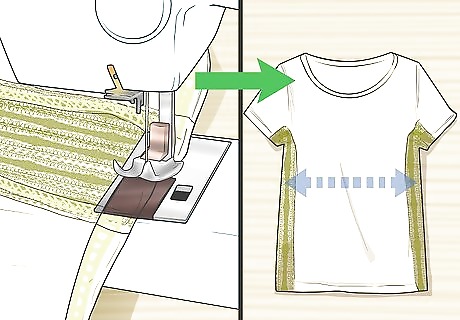
Expand your shirt by adding lace to the sides. If you have a shirt that’s too tight, create a slit that runs down each side of the shirt, starting from below the arm hole to the bottom of the shirt. Sew a section of lace onto each side, adding width to the shirt and making the sides partially transparent. For the arms, cut off the sleeves to create a sleeveless shirt and then use lace to create wider arm holes, if desired. If you'd rather the sides not be transparent, you can use a different type of material that goes with the shirt, such as flannel, cotton, or fleece. This process should work with most fabrics, but you may need to fold over and sew fabrics that fray easily.
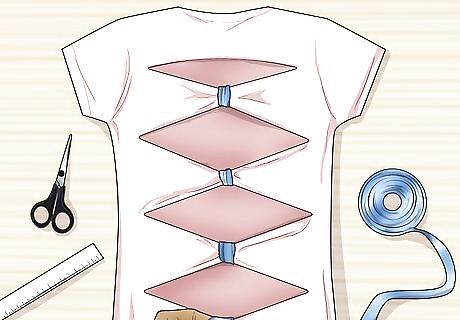
Slice the back of a t-shirt to create tied-off sections. Using a ruler to measure straight lines, cut 3 or 4 horizontal lines into the back of your shirt. The ends of the lines can start right where your shoulder blades stick out. You can use lace or ribbon to tie the middle of each cut section, creating wide diamonds in the back of your shirt. Make sure you space the lines evenly beforehand. Using a pencil to sketch out the lines before cutting is a good idea. To make sure the lace or ribbons stay in place, you can sew a few stitches into each section.
Bleaching and Dyeing
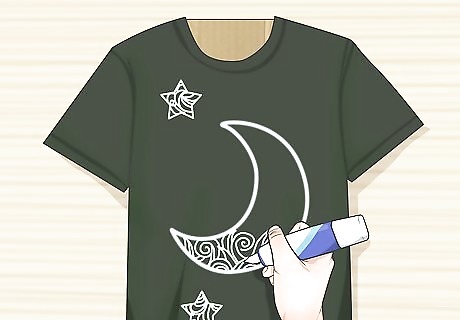
Use a bleach pen to draw patterns or words onto your clothes. After shaking up a bleach pen, use the pen to write wording on shirts, draw symbols on pants, or decorate any other piece of clothing that isn’t a white or light color. Rinse the article of clothing in cold water after the bleach sets. How long you let the bleach sit on the clothing will depend on the color of the shirt and how bright you want your design. Read the bleach instructions to get a more accurate idea of how long you should wait. Place a piece of paper or cardboard in the middle of the article of clothing to keep the bleach from bleeding through to the other side. It'll be harder to see a bleach design on a light color such as yellow, pink, or a pastel color, meaning you'll need to leave the bleach on longer than you would a dark color such as navy or black. Check your piece of clothing while it's bleaching to see if it's light enough.
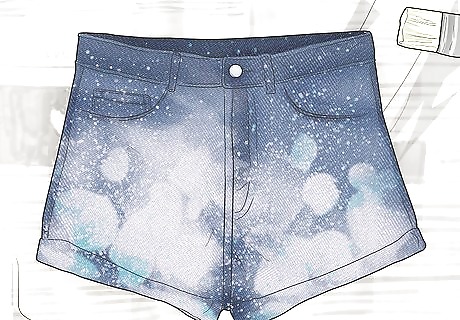
Splatter bleach onto clothing for an artsy look. If you’re going for a more sporadic, paint-splattered look, you can dip a paintbrush in bleach and lightly splatter an article of clothing. This looks especially great on denim material. Splatter the bleach on a surface covered with plastic to ensure you don’t get bleach on any furniture or other items. You can also splatter the bleach outside.
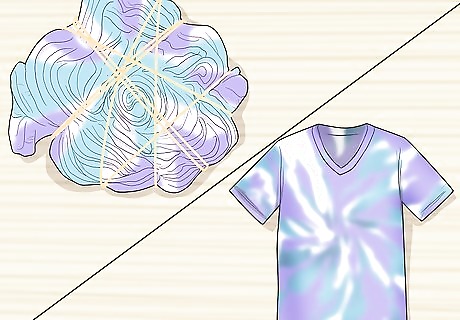
Tie dye white or light-colored clothing to create colorful designs. Take a white shirt, dress, or skirt and tie it up in rubber bands before applying the dye. You can also tie dye white or light jeans and shorts. Purchase a tie dye kit for complete instructions, as well as all the materials you’ll need to complete the tie dyeing. You can also purchase tie dye from a grocery store, picking which colors you want and reading the instructions to see how long to leave the dye on the clothing.













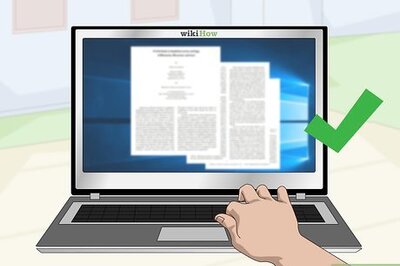
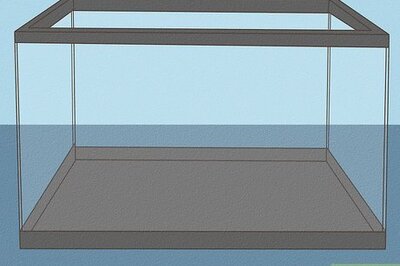



Comments
0 comment